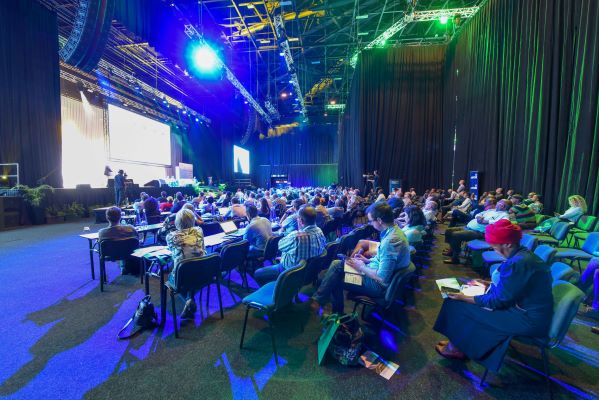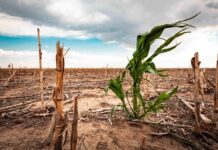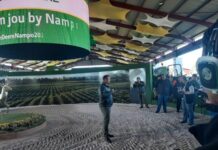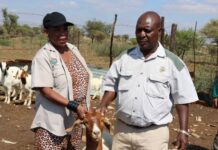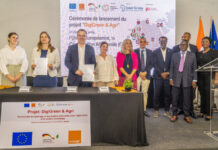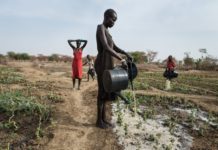South Africa continues to be a global pacesetter in many aspects of agriculture. This was evident from many of the presentations on the first day of the inaugural Africa Agri Tech Conference and Expo in Pretoria today (Tuesday, February 18).
The first day’s conferencing was headlined by Landbouweekblad magazine that is celebrating its centenary this year after having been established in 1919 as a channel to rebuild farming in South Africa after the ravages of the Boer War.
In his opening address the editor of Landbouweekblad, Chris Burgess, said it was interesting to note that South Africa and New Zealand were among the most advanced countries in the world in terms of agricultural development but were also among the countries that received the least support from their governments.
“They are among the world leaders in many aspects of agriculture,” added Burgess.
Mmboneni Muofhe, the Deputy Director General of the Department of Science and Technology, said the government welcomed partnerships with the private sector and, in the case of his department this was the way of making innovations a reality. He added that his department was very active in looking at ways to meet the growing threats of climate change, while on the positive side it was involved with ways of developing equipment that can be used for adding value in agro-processing.
Tavonga Siyavora, Program Manager – New Market Entry at John Deere, gave an insightful presentation into the rapid increase in the speed of introduction of technology in the company’s tractors and other farming equipment. The objective is to empower farmers to be more productive in the realm of precision farming through the use of data capture, telematics, and connectivity.
Willemien van Asselt was an overseas presenter who is the Director of International Strategy, Topsector Agri and Food in the Netherlands, which is one of the largest exporters of food in the world, despite its small size. It is also an importer of foodstuff which it processes and then exports.
She said agriculture in her country benefitted from a close cooperation between government, agricultural producers, and researchers – the so-called Golden Triangle. There were also many public-private partnerships in the industry, while there is now a renewed drive to educate more farmers of the benefits of adopting the latest technologies so they can be even more productive in the future.
Van Asselt added that increasing use was made of data obtained from individual farmers and that this data remained the property of eh farmer concerned, and other parties had to pay to use it.
“What we are now aiming for is to produce more food while reducing our footprint on the environment,” explained the Dutch visitor.
Eric de Vries, of Agri Technovation, said that farmers were being overwhelmed by approaches from technology companies promoting their wares and were generally not qualified to make a decision in this realm. He said farmers needed to know what data or equipment they really required to improve their productivity levels cost effectively. This is where they needed advisors with the relevant knowledge.
De Vries added that farmers must also realise that data had not only to be collected, but also monitored and interpreted to make it useful. De Vries said this was where his company’s My Farm Web platform was one of the solutions, which was being rolled out globally.
Francois van der Merwe, the CEO of CAN-Agri, presented a South African innovation that is finding traction globally. This is a vertical farming system for leafy greens, which is expensive to erect, but very cost-effective and efficient to operate as it uses a closed loop system of distributing water infused with nutrients. Van der Merwe said this greenhouse system was particularly useful in countries such as those in the Middle East where farming outside is impossible due to the heat.
BKB, a Port Elizabeth-based company which is celebrating the 100th year of its founding, has certainly not languished in its past. Instead it is leading the way in terms of transforming many aspects of the industry by developing digital aids for farmers through its SHIFT initiative and its increasing use of Blockchain for traceability and control of processes.
Jaco Maass, who is the General Manager of BKB SHIFT, says a wake-up call came when his team realised that Amazon was now becoming a major online retailer of meat meaning competition for farmers was taking a whole new turn and required the use of the latest digital technology to counter this new threat.
Cobus van Coller, of the farm Libanon in the Viljoenskroon district, gave an excellent, practical insight into the way agricultural output can be increased by using the latest, relevant technology in so-called precision farming.
Livestock is the largest component in agriculture’s contribution to the GDP of South Africa, but Dr. Michael Bradfield, a livestock consultant says it does not get the support it deserves in terms of investment in research and development. It also needs, urgently, to introduce traceability of the animals to satisfy the demands of major livestock and beef importers. He added that traceability also results in far less stock theft.
Benoit le Roy, of Water Shortage South Africa, says that farmers must realise that they will be first in line when cities and towns look to increase water supplies, because agriculture uses 60-70% of water in South Africa. He said it was thus important for farmers to develop systems and processes that decreased water usage.
Le Roy said that water, a fundamental economic enabler, was not being given the correct amount of attention from the government with ongoing policy uncertainly. He added that sorting out the country’s water shortage would cost more than R900-billion, which was double Eskom’s debt, while pollution was another major concern, with 80% of South Africa’s water resources being polluted.
Russel Luck, of SwiftVee, put up a strong case for the increasing use of virtual livestock auctions using various digital technologies. Luck says that these systems are increasingly important at times such as the recent outbreak of foot and mouth disease in Limpopo which resulted in a ban on live auctions. SwiftVee’s innovative solutions for virtual auctions, using smartphone apps, have resulted in it being one of 12 start-ups globally that are being given support by Google.
Landbouweekblad’s wide-ranging conference was concluded with a comprehensive review of the challenges awaiting farmers wishing to register with Eskom and Nersa to gain access to the national grid for their excess solar generating capacity. He said there were long delays and extensive paperwork. Chris Schutte, of Pretoria-based Sonfin said that although agriculture used only 3-6% of the country’s electricity it had great potential to generate solar power because of the available space to erect solar panel farms.



